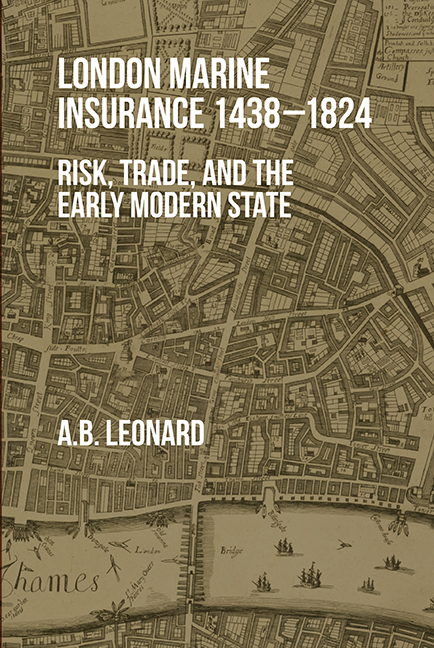Book contents
- Frontmatter
- Contents
- List of Illustrations
- Preface
- Glossary of marine insurance terms
- Introduction
- 1 The merchant-insurers’ system: London marine insurance to the 1570s
- 2 1570–1688: Buyers and the first intervention
- 3 1688–1720: The sellers’ intervention
- 4 To 1824: Lloyd’s and the common law
- 5 Conclusions
- Appendix: Some London underwriters active 1690–1717
- Bibliography
- Index
- Frontmatter
- Contents
- List of Illustrations
- Preface
- Glossary of marine insurance terms
- Introduction
- 1 The merchant-insurers’ system: London marine insurance to the 1570s
- 2 1570–1688: Buyers and the first intervention
- 3 1688–1720: The sellers’ intervention
- 4 To 1824: Lloyd’s and the common law
- 5 Conclusions
- Appendix: Some London underwriters active 1690–1717
- Bibliography
- Index
Summary
This book examines the role of institutions, broadly defined, in shaping markets. It does so through the lens of marine insurance in London, from its introduction in the late medieval period to the early nineteenth century. Its focus rests on a series of attempts to resolve the challenges created when newcomers participated in this established commercial market, particularly through initiatives which either introduced novel institutions, or changed, moderated, or cemented existing ones.
To achieve this, the book explores the evolution of marine insurance practice in London, based largely on an exploration and analysis of primary sources. Its particular approach examines specific attempts to accommodate newcomers to the practice of marine insurance who may not have understood or wished to follow the prevailing rules of the game. Such initiatives included regulation, legislation, precedent, organisational structure, and others. They met with various degrees of success. The dynamics of the multiple parties involved, and the interests they pursued, lie at the core of the discussion, and influenced the longevity of their interventions.
The period reviewed coincides with a critical era in the formation of the English state. The marine insurance case study sheds light on ways in which English governments, national and local alike, experimented through executive, legislative, and judicial actions to support the effective functioning of London's open market for marine insurance, to the benefit of trade. In so doing, state servants hoped, often outwardly, to promote economic growth. Ultimately a self-governing institution of insurers was established, but it was able to function at greater efficiency in conjunction with public-order institutions such as the common law, which supported the market when the entry of outsiders presented challenges. Such institutions were not necessary for the very functioning of the market, as has been suggested, but they allowed it to function incrementally more smoothly and efficiently, amidst reduced uncertainty, as they matured.
Following an introductory chapter, Chapter 1 of this book discusses the origins and development of insurance before its introduction to London, when the fundamental structures of the market and its institutions were developed. It shows how merchants’ system of insurance and the rules that govern practice evolved in Italy before being exported to multiple commercial centres, including London.
- Type
- Chapter
- Information
- London Marine Insurance 1438-1824Risk, Trade, and the Early Modern State, pp. ix - xPublisher: Boydell & BrewerPrint publication year: 2022

